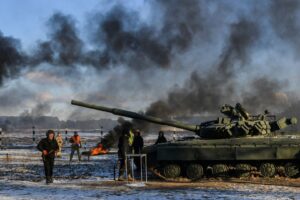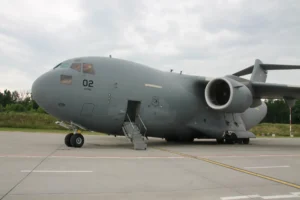President Recep Tayyip Erdoğan said on Monday that Türkiye is the only country striving to prevent a global food crisis and nations, especially the people of Western countries, should know that, as he stressed the country’s efforts to unblock the key Black Sea grain corridor.
Addressing reporters aboard the presidential plane during his return from the G-20 summit in India, Erdoğan said Türkiye would continue working on restarting the key wartime agreement that ensured safe shipment of Ukrainian grain through the Black Sea despite Russia’s invasion.
The U.N.- and Türkiye-brokered Black Sea Grain Initiative was vital for global food supplies, especially in Africa, the Middle East and Asia. Ukraine and Russia are major suppliers of wheat, barley, sunflower oil and other goods that developing nations rely on.
“We have done our part to ensure that the world does not enter into a new crisis and that disadvantaged countries do not face hunger, and we continue to do so,” Erdoğan said.
“Nations, especially the people of Western countries, should know that Türkiye is the only country that is striving to prevent the global food crisis. We will continue to generate solutions and make efforts to reopen this corridor until the end.”
The pact collapsed after Russia pulled out in mid-July, complaining that a parallel agreement promising to remove obstacles to Russian exports of food and fertilizer hadn’t been honored and that insufficient Ukrainian grain was going to countries in need.
Within the pact framework, about 33 million tons of grain were delivered to international markets.
Erdoğan said he plans to talk again with Russian President Vladimir Putin about reviving the Black Sea corridor to help least-developed African countries.
The two leaders met in the Black Sea resort of Sochi last week to discuss the initiative.
After their summit, Putin said Moscow was close to finalizing an agreement to facilitate free grain exports from Russia to six African nations with the help of Türkiye and Qatar.
Still, the proposal is not planned as an alternative to the Black Sea initiative, he said.
The deal would include a supply of up to 1 million metric tons of grain to countries most in need via Türkiye with financial support from Qatar. The grain will be sent for subsequent processing at Turkish plants before being shipped to the African nations.
Erdoğan said he had addressed the plan during a meeting with Russian Foreign Minister Sergei Lavrov in New Delhi and that they sought to increase this figure further.
“I will discuss this issue with Mr. Putin again by phone; it is useful to reassure the least developed African countries by increasing this amount,” he said.
Upcoming U.S. trip
Türkiye has positioned itself to facilitate any peace talks between the warring sides. It has opposed the Russian invasion but also the Western sanctions on Moscow.
Erdoğan has maintained good relations with Putin and helped broker prisoner exchanges between the warring sides.
He on Monday reiterated his call on Western countries to realize their promises to Russia and do their part to unblock the grain initiative.
Moscow’s demands include returning its Agricultural Bank to the SWIFT payments system and insuring the ships involved in the initiative.
The grain deal issue will be among the top agenda points at the United Nations General Assembly later this month, Erdoğan said.
“I will extensively discuss the efforts our country has made on this matter,” he added.
In a recent letter to Russia, the U.N. said a unit of the Russian Agricultural Bank in Luxembourg could immediately apply to SWIFT to “effectively enable access” for the bank to the SWIFT international payments system within 30 days – the idea Moscow has dismissed.
Lavrov on Sunday said “no one, including (U.N. Secretary-General Antonio) Guterres,” has promised that the Russian Agricultural Bank would be reconnected to SWIFT and that the bank’s Luxembourg unit has no license for banking operations and plans to close down.
Erdoğan on Sunday said he would ask Guterres to send an updated version of the letter on the SWIFT channel and insurance.
Among others, the Turkish leader said during his upcoming trip to New York, he will meet with many firms that have investments in Türkiye. “We will have direct discussions with them,” he noted.
$550M financing for Turkish petrochemical plant
Erdoğan said a Washington-based financial institution had secured $550 million in financing for a petrochemical plant in Ceyhan on Türkiye’s Mediterranean coast.
He said he had previously discussed joint steps in the petrochemical sector with Algerian President Abdelmadjid Tebboune in Istanbul.
Turkish conglomerate Rönesans said in July that its investment with Algeria’s Sonatrach in a polypropylene facility in Ceyhan had been revised to $1.7 billion, with around $1 billion to be financed by loans.
Nuclear power plant talks with South Korea
Erdoğan stressed that with concrete steps such as the planned establishment of a natural gas hub in Türkiye, which is being discussed with Russia, the global price of natural gas will be determined in Türkiye.
At the G-20 summit, he said he discussed with his South Korean counterpart the building of a third nuclear power plant in Türkiye, following the Russian-built Akkuyu plant and a second one for which works are underway.
He added that an India-Middle East-Europe Economic Corridor, the subject of a pact signed at the G-20 summit, cannot happen without Türkiye, as the most suitable route from East to West must go through the country.
A memorandum of understanding between the EU and seven countries foresees an economic corridor linking Europe with the Middle East and India via rail and shipping lines.
The multinational railway and maritime project between India, the U.S., Saudi Arabia, the United Arab Emirates (UAE), France, Germany, Italy and the EU aims to connect India to the Middle East and Europe to enhance trade, provide energy resources, and develop digital connectivity.
While the signatory countries did not commit to a binding financial obligation, they agreed to prepare an action plan for the establishment of the corridor within two months.
Ties with Egypt
On relations with Egypt, Erdoğan said his meeting with President Abdel-Fattah el-Sissi at the G-20 summit was positive, and the topic of mutual visits was discussed.
He said the two countries planned to double bilateral trade volume and revive a High-Level Strategic Cooperation Council.
Türkiye and Egypt upgraded their diplomatic relations by appointing ambassadors to each other’s capitals in July after a decade of tension.
Improving the relationship with Egypt may lead to positive outcomes in many regional issue areas, especially the Syrian war, Erdoğan said.
Source : Daily Sabah















